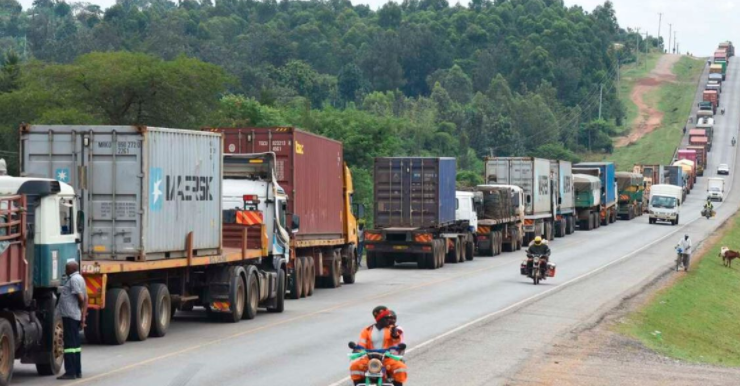Hundreds of truckers today resumed movement along the Juba-Nimule highway after a three-week-long strike.
The drivers of the heavy goods vehicles parked at the Uganda-South Sudan border to protest insecurity, the killing of their colleagues and other road users, extortion by armed forces, and multiple illegal taxations among other evils.
The resumption of haulage came after a stakeholder meeting between the government of South Sudan, Uganda, and representatives of traders from Uganda, Kenya, Ethiopia, and Somalia yesterday in Nimule town.
Major Juma George, the director of traffic police in Nimule Town Council told Radio Tamazuj earlier today, “They started this (Tuesday) morning. The real movement, especially fuel trucks and other goods has started now and the commercial vehicles will follow. The road is open officially. They were told that security along the road is good, no more problems. Nobody will ask someone along the road, that is why they started.”
The deputy spokesperson of the South Sudan National Police Service, Brigadier General James Dak, confirmed the resumption of the heavy goods vehicles and said an agreement was reached by the parties to compensate those who lost lives and properties at a top political level.
“Yeah, the trucks are already moving and we are going to receive them in Nesitu at 2 pm. The president of Uganda gave orders that they (truckers) should lift their strike,” Brig. Dak said. “In regards to their demands, it will be done at the high level through foreign affairs ambassadors of the three countries of Kenya, Somalia and Uganda. They also involved the ambassadors of Ethiopia and Eritrea.”
He added: “For security on the way, we agreed that there will be an escort from Nimule to Juba. They also agreed that there will be only one point of revenue collection done at the one-stop center in Nimule. There will be no other revenue collection (points) along the highway until they arrive juba.”
When asked about the sustainability of the armed convoy escort along the highway, Brog. Dak said it depends on the cooperation of the road users, including the citizens living along the highway.
“The (escort) sustainability depends on cooperation. We need the cooperation of all road users so we are making advocacy through the community that they should help us. Although we are mandated by the transitional constitution of South Sudan 2011, we still need the help of the community,” Brig. Dak said. “They must assist the organized forces because these outlaws are staying among them and they know them. So they must keep watch alert and give us surveillance intelligence information so that we can rush.”
He also appealed to the government to improve the welfare of the armed forces and pay their salaries on time to avoid them turning into robbers.
“We are also advising our government to motivate the forces so they do not turn out to be the robbers by giving them salary on time and by motivating them and keeping them disciplined all the time,” he said.
Sansa Moses, the chairperson of the Ugandan community in Eastern Equatoria State, Torit town, confirmed the resumption of the truckers but cautioned the South Sudan government about the lackluster implementation of the agreed issues.
“The agreement is good if they put it in process, it will work. It is better than what they agreed is put into action. It is all about security along the road. The strike has affected business in general both on the side of Uganda and South Sudan, including even Kenya and other neighboring countries,” Sansa said.




